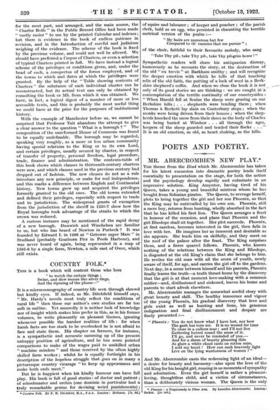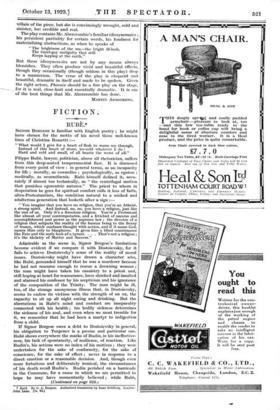POETS AND POETRY.
MR. ABERCROMBIE'S NEW PLAY.*
Tim theme from the Iliad which Mr. Abercrombie has taken for his latest excursion into dramatic poetry lends itself essentially to presentation on the stage, for both the action and the psychology develop rapidly and culminate in an impressive solution. King Amyntor, having tired of his Queen, takes a young and beautiful mistress whom he has bought from Sidonian pirates. The Queen, to revenge herself, plots to bring together the girl and her son Phoenix, so that the King may be outrivalled by his own son. Phoenix, still a mere boy, returns from hunting, wholly absorbed in the fact that he has killed his first lion. The Queen arranges a feast in honour of the occasion, and plans that Phoenix and the
girl Rhodope shall sit together. Her plot succeeds. Phoenix, at first careless, becomes interested in the girl, then falls in
love with her. He imagines her as innocent and desirable as she appears. She leads him on skilfully, and they meet on the roof of the palace after the feast. The King surprises them, and a fierce quarrel follows. Phoenix, who _knows nothing of the relations between the King and Rhodope, is disgusted at the old King's claim that she belongs to him. He reviles the old man with all the scorn of youth, newly aware of itself, for age, and carries the girl off to the gardens. Next day, in a scene between himself and his parents, Phoenix finally learns the truth—a truth thrust home by the discovery that the girl is at that moment love-making with a common soldier—and, disillusioned and sickened, leaves his home and parents to start afresh elsewhere.
Mr. Abercrombie manages the somewhat sordid story with great beauty and skill. The healthy innocence and vigour of the young Phoenix, his gradual discovery that love and girls exist as well as hunting and lions, his generous indignation and final disillusionment and despair are finely presented :—
" Phoenix : You do not know what I have lost, nor how The gash has torn me. It is no wound for time To close in a callous scar ; and I'll not live Gathering hatred round the sense of it. I'll go, and never be reminded of you.— And for a sheen of beauty gleaming thin As glare a white cloud casts on rotten mire, I sold my heart! How can such heavenly light Live on the lying wantonness of women ? "
And Mr. Abercrombie casts the redeeming light of an ideal- s desire for beauty and harmony--also upon the love of the old King for his bought girl, rousing in us moments of sympathy and admiration. Even the girl herself is rather a pleasure- loving, thoughtless child, and a victim of circumstances, than a deliberately vicious woman. The Queen is the only
• - Phoenix : a Tragicomedy in Three Ade. By Laseelles Abercrombie: London: Seeker. Os. netj
villain of the piece, but she is convincingly wrought, cold and sinister, but credible and real.
The play contains Mr. Abercrombie's familiar idiosyncrasies ; his persistent partiality for certain words, his fondness for materializing abstractions, as when he speaks of
"The brightness of the sea—the bright ill-luck, The tinsel-gay malignity that still Keeps lapping at the earth."
But these idiosyncrasies are not by any means always blemishes. They often produce vivid and beautiful effects, though they occasionally (though seldom in this play) drop to a mannerism. The verse of the play is eloquent and beautiful, dramatic in itself and made to be spoken. Given the right actors, Phoenix should be a line play on the stage, for it is real, close-knit and essentially dramatic. It is one of the best things that Mr. Abercrombie has done.
MARTIN ARMSTRONG.



























































 Previous page
Previous page